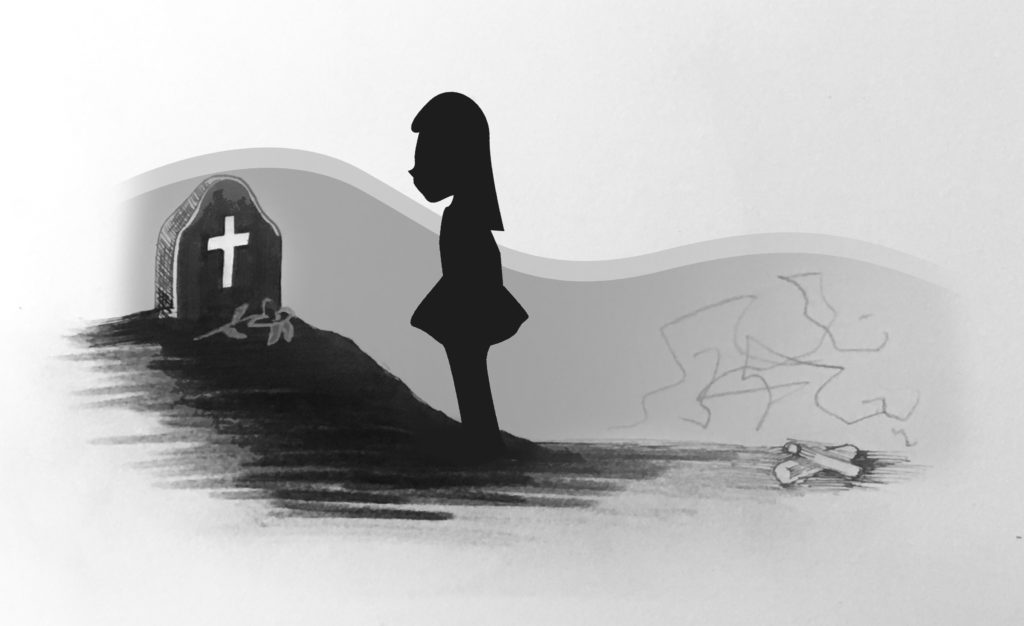by Kai Tsao
Art by Carrie An
Issue: Ataraxia (Spring 2018)
for my brother.
My walls are plastered with expensive art. You’d never know what goes on in the artist’s head, because they are no longer alive.
My linen is decorated with the most exquisitely intricate human works. They say that the artist painted them in her sleep.
⁂
When I was young, I remember my parents trying to scrub the crayon and the sharpie marks off my house’s off-white walls. Making calls to repair a broken TV or a water-splashed computer screen. My sister Rosie would sit with me, slowly glancing around, listening to the long phone calls, and when we got bored of those, the two of us would take our scooters and zip around the block in a summer evening’s breeze. We would design the sidewalks (for free!) with our cylindrical blocks of chalk, and I would cup Rosie’s face in my hands, and she would cup mine in hers, and when we knew the powdered remains of chalk had stained our young cheeks, we would let go and whisper, “your makeup looks so good.” We would bring a soccer ball outside and kick the lights out of it until our parents told us that we were “disturbing the neighbors” and “a little too rowdy, Lily.”
Rosie never really got into boys or romance, but I (insert hair flip) dated three boys in middle school. The first one, Fayden, was pretty loud and obnoxious, but… was pretty. He told me he loved how skinny I was and how my long, straight hair fell around my shoulders. I loved him. The second, Aaron, was much quieter and more reserved, but things didn’t work out with him because he was too proper and obedient for my adventurous soul. He told me that he loved my personality and my face, if he were to order them by importance. I liked him well enough.
As the television in my house grew thinner and thinner, I grew bigger and bigger. My jawline slowly faded. I stopped scootering around with Rosie and didn’t pay much attention to the artwork on the walls of my house anymore. When I brought my boyfriends home, we would pretend that my walls were pearly white.
I bought my first makeup palette for $35 (which was all the money in the world to a twelve-year-old), and I loved it. I took the freckles and the acne off my face and flirted courageously. My friends would tell me, “your makeup looks so good.”
I would watch the trees sway outside with my third boyfriend, Trevor, in the breeze of a summer evening. We lasted well into high school. He said he loved me because I brought so much energy to him, so much beauty–just like a lily would. I loved him with all my heart. We both ignored it carelessly when his friends referred to me as his “fat bitch.”
Trevor always tried to include Rosie on our dates, talking to her in his distinctly sweet tone, bringing her chocolate and small gifts: a yo-yo, a rubik’s cube, a spinning top. Rosie would always smile her soft, crooked smile, and cup his face in her hands.
Sometimes, though, I wished that Rosie wasn’t there. I wished that I could somehow bring the attention off of my sister, even though I knew completely well that Trevor never had those kinds of feelings for Rosie.
I wanted my jawline back. I remember staring, dazed and light-headed, at my toilet, which I decorated with the most exquisitely intricate human works. Every night, I cupped the toilet bowl with my two hands and expelled all possible waste from my body. While I fasted, often for weeks, I would watch hungrily as Rosie chewed her food silently.
I hated Rosie. I would sling our soiled bed-sheets over the clothesline to dry, because she’d decorated them in her sleep. I felt so much disdain looking at the crayola-stained walls that I eventually screamed for my parents to paint over them, pearly white.
And Rosie never said a word. Rosie, my autistic sister, who had suffered with leukemia all her life, who was never potty-trained, who loved to throw her colors on my walls, who had to sleep in my room because she was too scared to use her own, who would only whisper once in a while: “your makeup looks so good.”
And I hated myself for hating Rosie. When Trevor broke up with me, I vomited again into the toilet bowl, crying until I seemed to have no tears left, and Rosie came, cupping my face in her hands, her eyes wavering, and I kept saying, “I’m sorry, I’m sorry, I’m sorry,” and Rosie was frantically telling me that my makeup looks good, even though my mascara had run so far down my cheeks I felt that it would somehow find the jawline that I’d been looking for. We took each other into my room, where I wiped my makeup and vomit off, and we played soft music out of my speakers, opened the window, and laid together in our bed, in the summer evening breeze, staring at the pearly white walls.
And she cupped my face in her hands again, as if she were trying to remember every last detail under her palms, the gradually-returning jawline, the pimple that had been ruining the left side of my jaw, the smooth, silky skin of my neck. I loved Rosie. I cupped her face in my hands, wishing I could somehow take back all my hate for her, wishing I could just live casually, washing chalk off of my sister’s face again, admiring her artwork on my walls again.
Three weeks later, my sister was buried in a cemetery near the hills. My parents and my friends ridiculed me for wearing makeup to the funeral, but I knew that if she could see me, and my “on-fleek” eyebrows, and my waterproof mascara, she would cup my newly-sharpened jawline in her soft, clammy hands and whisper to me, “your makeup looks so good.”
⁂
My walls are plastered with expensive art. You’d never know what goes on in the artist’s head, because they are no longer alive.
My linen is decorated with the most exquisitely intricate human works. They say that the artist painted them in her sleep.
author’s note: in addressing topics such as neurodevelopmental disorders, eating disorders, and cancer, my goal is to express emotions stemming from my personal life. The way that our protagonist obsesses over covering/altering her flaws is a representation of social expectation and its effect on youth today.

